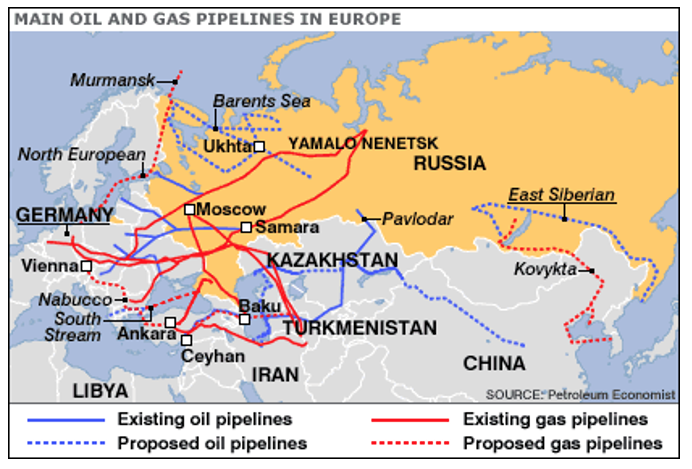CommentsPLANNING WATCH - Since February 24, 2022, when Russian troops moved on the Ukraine, there have been a flurry of articles calling for the reduced use of fossil fuels.
For example, the Los Angeles Time’s climate reporter, Sammy Roth, has written several pieces on the importance of transitioning away from fossil fuels in response to this war.
Mr. Roth makes these points:
-
Slashing emissions could deal a blow to Russian President Vladimir Putin.
-
Quoting UC Berkeley Professor Severin Borenstein, “Getting off oil…will help to undermine the finances of not just Russia, but Saudi Arabia, Iran, Venezuela, and all sorts of autocratic regimes. It is ethical in the climate change sense. But, it’s also more ethical in the democracy and freedom and human welfare sense.”
While the long-term goal of reducing the extraction and use of fossil fuels is indisputable, promoting these reductions to dampen a consumer backlash against the war because of higher gasoline prices or to undermine the developing fossil fuel relationship between European states and Russia is disputable.

As I have previously written in CityWatchLA, there is much that we could immediately do, including in Los Angeles, to accelerate the transition to sustainable energy. These climate change mitigation programs are well known, ready for local implementation, and have no connection to current anti-Russian media campaigns.
-
Prepare, adopt, implement, and monitor a Climate Change Element added to LA’s poorly maintained General Plan. This omission is hardly a surprise since most Los Angeles mayoral candidates fail to mention climate change in their campaign platforms.
-
Plan, fund, and build alternatives to private cars. These include low-priced and easily accessible pedestrian, bicycle, electric scooter, carpooling, vanpooling, bus, trolley, subway, and rail transportation options.
-
Roll-out first-last mile amenities and free transit fares to encourage the public to switch from cars to these transportation options.
-
Encourage houses, apartments, and commercial buildings to install rooftop solar through feed-in tariffs, subsidies, grants, and tax credits. Instead of such barriers as new grid connection fees, public policy should encourage, not discourage, the transition from fossil fuels to sustainable energy.

There is nothing new about these programs, including their ability to reduce CO2 emissions. These programs long preceded the current war in the Ukraine, and they benefit the entire planet, not just the United States.
Furthermore, the planetary necessity for climate change mitigation programs will continue long after the Ukraine war either ends or becomes a protracted Pentagon-sustained war of resistance to the Russian army, like Afghanistan.
Arguments to embrace sustainable energy policies to check blowback against current US miltary policies leave much to be desired.
-
There is no evidence that either Congress and the White House have suddenly reversed their support for the expanded extraction and use of fossil fuels. In fact, the Biden Administration has approached domestic frackers, Venezuela, and Iran to ramp up their oil production to offset US sanctions on Russia.
-
While Congress has approved about $1 trillion/year in overall military expenses, including $13.4 billion more for the Ukraine, there are no comparable funding increases for sustainable energy programs.
-
The dormant Green New Deal, which preceded the Ukraine crisis by many years, is like an ancient insect forever trapped in amber. Do the White House and Congress even remember it?
-
Russia, like the United States, is a petro state. The US is the world’s largest producer of fossil fuels. Saudi Arabia is second, Russia is third, and China is eighth. The extraction and consumption of oil, gas, and coal play an outsized role in their economies and foreign policies, and the increased profitability of fossil fuels means that these countries will cash in on, not walk away from, fossil fuels.
-
Wars accelerate the consumption of fossil fuels, and the Ukraine war and the global increase in military expenditures, now $2 trillion/year, mean that climate change trends are moving in the wrong direction. In fact, the Pentagon is the world’s largest fossil fuel polluter, and its carbon footprint is expanding.
The message from climate activists needs to move on two tracks:
Track one is the rapid implementation of climate change mitigation programs. According to the UN’s Sixth Assessment Report: Climate Change 2022, this is necessary to prevent an imminent death spiral encompassing the entire planet, not just the United States.
Track two is to support movements that call for major reductions in military expenditures and wars (most of which are for control of hydrocarbons), whether they are in Iraq, Afghanistan, or in the Ukraine.
Both tracks lead to the same outcome, avoiding a certain global climate catastrophe.
(Dick Platkin is a former Los Angeles city planner who reports on local planning issues for CityWatchLA. He serves on the board of United Neighborhoods for Los Angeles (UN4LA) and co-chairs the Greater Fairfax Residents Association. Previous Planning Watch columns are available at the CityWatchLA archives. Please send questions and corrections to [email protected].)
















